‘When I became desperate’: Opinions of residents during forced land acquisition in Kyaikmayaw Township
January 18, 2011
Introduction
Since the release of the Human Rights Foundation of Monland’s (HURFOM’s) October 2010 report, Waiting In Tears[1], farmers in Kyaikmayaw Township, Mon Sate, have faced increases in pressure to give up freehold land holdings that have been passed down from generation to generation, in order to make way for the construction of several private large scale cement factories and lime stone processing plants.
Throughout the month of December 2010, land owners of Ni Don and Mae Garow villages have faced significant efforts by the development company, Zaykabar Company, and local Village Peace and Development Council (VPDC) leaders, to give up their farms. While residents have been offered some tenable opportunity for compensation by Zaykabar Company, the amount offered for compensation is 9 times lower then the estimated value of the per acre price for the land. Zaykabar Company staff and senior leadership have made multiple visits to the area, demanding that residents settle for this degraded price. Additionally, villages have been exhorted by the movie actress Nan Dar Hlaing to sell their land, and were threatened by the local village headman that if they refuse to sell, they would be forced to leave the area. Download report as PDF [467KB]
Given the overt efforts by Zaykabar and village leadership to wrest land from local farmers, hundreds of families have been directly impacted by the coordinated effort to undermine the value of their property. This report details the accounts gathered by 4 reporters from at least 20 paddy field owners who have been pressured to sell their fields. Given the specificity of this project, security has been an utmost concern of reporters and residents willing to comment on the current situation. As a result the accounts here, have been edited to conceal the identities of the speakers.
Octo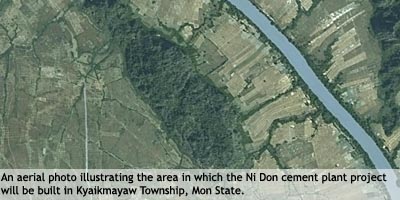 ber to November
ber to November
In late October villagers and farmers situated around Ni Don Mountain working with community leaders, monks, and a locally based lawyer U Nay Win drafted a petition letter directly to Sen. General Than Shwe, requesting that he intercede on the communities’ behalf and ensure that they receive compensation for their land prior to the construction of the Ni Don cement factory. The letter, consisting of bulleted concerns and requests, and the signatures of 30 to 50 landowners, has received no direct response.
The then controlling company, Hexa International Company Ltd, had already surveyed and taken soil samples from both the Pyar Taung area (including Pyar Mountain) near Kaw-Don and Kaw-Pa-Naw villages and the Ni Don Mountain area near in Ni Done village, for cement production. Announcements to local residents indicated that the company would confiscate the paddy land after harvest time from paddy field owners.
Since then, ownership of project has been shifted from Hexa International to Zaykabar Company Limited in the final week of November, according to a government source. The staff member noted that the switch in ownership does not extend to the Pyar Don cement production project, which has already seen 800 acres of land confiscated east of the Ahtaran River in the name of Hexa Internationals’ construction effort.
Zaykabar Company President, Dr. U Khin Shwe, posses significant personal connections to the current regime, which is likely the reason for Zaykabar’s sudden replacement of Hexa International as the controlling company of the Ni Don project. U Khin Shwe recently won a seat in the Amyotha Hluttaw on November 7th as a Union Solidarity and Development Party (USDP) candidate in Rangoon Division. Additionally, U Khin Shwe’s daughter married the son of the third most power general in the regime, General Thura Shwe Mann. In an apparent attempt to bolster U Khin Shwe’s credentials further, he was awarded two Honorary Doctorates of Philosophy in Business Administration from the Washington University and Southern California University in 1998[2]. However, in a rapid rebuttal, Washington University, St. Louis, released a statement refuting the award[3]. In reality U Khin Shwe paid for the degree from a degree mill based in Hawaii, which was then awarded by the ‘American Education Foundation’, a company that only exists in Singapore. He is currently on the US list of sanctioned businessmen due to these close ties to the Burmese regime.
November, Opening Demands
During the third week of November, 2010, four representatives from Zaykabar Company organized and led a meeting for 70 Mon land owners from Ni Don and the nearby village of Mae Garow, whose land is located in the area of the cement plant project. At the meeting the group of representatives of Zaykabar Company explained to the landowners about the slated Ni Don Cement Plant project. Afterwards, landowners were told to announce how much they would be willing to accept for payment as compensation for their land. Despite this, according to participants, several landowners noted that even if they were paid a significant amount for their acreage, they would still not be able give up their lives as farmers as they had no other skills.
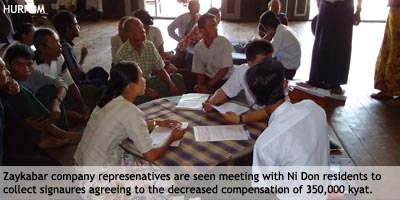 The landowners responded using 5 local residents fluent in Burmese as translators, in order to, according to a participant, guard against being entrapped in language as local land owners spoke little to no Burmese. In multiple instances residents used the Burmese speakers to refute claims by Zakabar representatives intended to lower the value of the land. The speakers were able to refute accusations that local land had little value or was worthless due to the presence of salt water in the near by river, clarified to residents that Zaykabar Company could not implement the project without receiving the land owners signatures to agree to compensation for the land, and proved the presence of land certificates and ownership of property.
The landowners responded using 5 local residents fluent in Burmese as translators, in order to, according to a participant, guard against being entrapped in language as local land owners spoke little to no Burmese. In multiple instances residents used the Burmese speakers to refute claims by Zakabar representatives intended to lower the value of the land. The speakers were able to refute accusations that local land had little value or was worthless due to the presence of salt water in the near by river, clarified to residents that Zaykabar Company could not implement the project without receiving the land owners signatures to agree to compensation for the land, and proved the presence of land certificates and ownership of property.
Several representatives from Zaykabar Company attempted to intimidate villagers, noting that the State government would fully intend to implement the Ni Don Cement Plant project. Additionally the representatives warned that residents should not trust other landowners who demand more money for their acreage, or think they can hold out and stay on their land, and instead sign an agreement now to receive compensation of 350,000 kyat per acre[4].
In response to Zaykabar’s offered price, property owners proposed that they would be satisfied if they were compensated at a price of 3 million kyat, an estimate they believe to be equal to the current value of the land. HURFOM has confirmed with a lawyer that has worked with the community on land ownership issues as well as a retired member of the Burmese Land Record Department, that 3 million kyat per acre is a reasonable price for 1 acre of high quality paddy land and the current crops of either paddy rice or ground beans that are near harvest.
After hearing the community’s proposal of 3 million kyat per acre, the Zaykabar representatives replied that they would come again on December 3rd to compensate the 60 landowners who signed over their land, and to ask the remaining famers to sign an agreement for compensation for their land. During this 1st meeting in which Zaykaba representatives did not confirm if prices were set at 350,000 kyat per acre, but landowners concerned that they would loose their land without compensation, opted to sign the agreement now, and work out the details of the compensation they requested on the second meeting on December 3rd.
December 3rd to the 6th
After the departure of Zaykaba representatives, the landowners from Ni Don village and near by Mae Garow village, met local community members with legal and political experience and Mon monks. According to a resident who attended the meeting, a discussion was held on the details of the cement plant project with the land owners who had received the compensation, and land owners who haven’t made a decision, as well as the value of freehold land, the direct impacts that would occur on their current lifestyles, the threat to the historical Buddhist relics and religious implications of the destruction of the Ni Don Cave Buddhist temple. Additionally community members raised concerns of the larger social impacts of the development projects, including loss of ethnic identity as Burmese and foreign workers are brought in and Mon farmers are moved out, as well as the loss of local language, and environmental impacts of a heavy industrial project being built in the heart of the community.
 This meeting, and other efforts to educate local residents about the impacts of the Ni Don Cement Plant, were apparently reported to the Kyeikmayaw Township Peace Development Council (TPDC) and Zaykabar Company, according to a local resident. Despite promise to hold a second meeting on December 3rd, no representatives from Zaykaba Company or the local TPDC arrived.
This meeting, and other efforts to educate local residents about the impacts of the Ni Don Cement Plant, were apparently reported to the Kyeikmayaw Township Peace Development Council (TPDC) and Zaykabar Company, according to a local resident. Despite promise to hold a second meeting on December 3rd, no representatives from Zaykaba Company or the local TPDC arrived.
Residents believe that from December 3rd to December 6th when the meeting was finally held, Zakabar Company President U Khin Shwe in some way paid local village leadership to support their effort to obtain local land at extremely discounted prices. According to a source close to the local headman, three staff of the VPDC and the headman, were promised significant financial gain if they assisted in moving the project forward by getting land owners to sign over their property.
During those 3 days, these members of the VPDC supporting the sales of the land, visited the 153 local landowners to, according to these landowners, cause division among their opinion. In every case these members of the village leadership strongly pressured local residents to accept the 350,000 kyat price.
Nai K_ T_, 28, a nephew of a Ni Don resident and land owner, describes how on December 5th the village headman, his brother, and several staff from the VPDC, attempted to spilt the resistance to local land owners by telling them they would loose their land without any compensation if they did not accept Zaykabar’s compensation:
During these three days [from December 3rd to 6th] the VPDC headman and his trusted persons [worked] to convince [the land owners] in various ways. The headman, Nai Kyaw Tun told [owners] that, ‘If you accept the money now, you will gain an appropriate amount of money but, later, if Zaykabar Company transfers this case to the particular [government] authorities for a solution, you will lose your land without gaining any money.’ Most people think that Zaykabar Company gave the headman a lot [of money]…And then, he is not a good speaker so he and his brother’s talk seemed to sound like an order or threat. Anyhow, there was a great division among the land owners whose land will be confiscated. They were mentally disunited. And then, I and some youths who have been working for that case became downhearted. As they were mentally disunited, their voices were also different. Most of the landowners are very honest Mon, but have low education. Most of them are frightened so the headman Kyaw Tun’s talk made them confused. Among them [land owners], only the minority [from the meeting] didn’t accept the [Zaykabar Company] compensation even though their land will be confiscated. So I don’t know what will happen. On December 6, Zaykabar Company and the authorities from Kyeikmayaw will come again. I heard from a source that the issue of giving compensation and signing [an agreement] must be finished…I don’t know what will happen.
December 6th
On the morning of December 6th, Zaykabar owner Dr. Khin Shwe, 58, his son, U Zay Thiha, 34, and his daughter-in-law, movie star, Nan Dar Hlaing, Zaykabar General Manager U Hein Aung Kyaw, Kyaikmayaw TPDC members, several project investors, retired SPDC military staff, and about over 20 staff from the Kyaikmayaw Land Surveying Department, arrived Ni Don village by car.
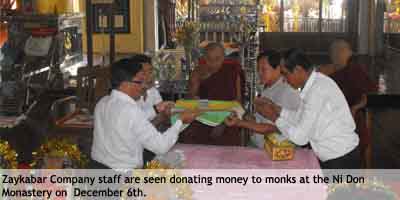 The same day at about 10 AM, with the help of village headman Nai Kyaw Tun, 54, and the members of the VPDC, a meeting was organized at old Ni Don Monastery, in which all Ni Don residents and land owners were ordered to send one person from each household. One resident who wished to remain anonymous, recounted the speech made by Zaykabar Company president U Khin Shwe to Ni Don resident landowners and prominent persons at the meeting:
The same day at about 10 AM, with the help of village headman Nai Kyaw Tun, 54, and the members of the VPDC, a meeting was organized at old Ni Don Monastery, in which all Ni Don residents and land owners were ordered to send one person from each household. One resident who wished to remain anonymous, recounted the speech made by Zaykabar Company president U Khin Shwe to Ni Don resident landowners and prominent persons at the meeting:
We came here to make this remote and unknown village, Ni Don, into a world known project. I expect that coming today Ni Don village gentlemen would warmly welcome our project to construct a cement plant as it is [also] a local development project. I appeal to all gentlemen to accept the proper compensation for the paddy land included in the project [area] and sign [the agreement]. We promise to actively work for the development of this village and its surroundings, for locals as well as this cement producing project. The modern and high-standard wide roads must substitute the muddy roads of rainy season and the dusty roads of summer season. Your living standards will be improved because in our project; we have already planed to make [the village] metropolitan. Please say what you want it to become. We have to construct schools? Social buildings then roads and communication?…. what we can offer?… please tell us. We are ready to offer what we can. If this project starts, you don’t need to worry about your employment.
Zaykabar Company General Manager U Hein Aung Kyaw, explained that they came to give compensation for the paddy land which is located in the project area nearby Ni Don Mountain, a non negotiable price of 350,000 kyat set by Zaykabar Company. While there appeared to be some expectation that the pressure by the local villager leadership, and deferential introduction would win the support of residents for this price, the of failure to attract additional signees prompted a change in tactics of the delegation.
Nai …, 56, Ni Don resident who owns 3.8 acres of paddy land and had attended the meeting, noted that U Khin Shwe and U Hein Aung Kyaw urged land owners to sign the agreement, while senior staff from Kyeikmayaw TPDC and Ni Don village headman Nai Kyaw Tun, applied more coercive efforts to force land owners to sign. Accoring to Nai…, Nai Kyaw Tun told landowners:
‘You [referring to the land owners]! Now, the most senior leaders from Zaykabar Company came here to provide proper compensation. If you hesitate to accept [a compensation of] three hundred and fifty thousand [kyat] per acre, you will get only about ten thousand [kyat] per acre as the State price when Kyeikmayaw TPDC handles this issue. At that time, you will lose your land with the lowest compensation…You must all deeply consider and accept the compensation and sign [the agreement].’
A landowner who expected to sign the agreement to accept about 3 million kyat per acre of land, describes his disappointment at villager demands being ignored:
No representative of Zaykabar Company who met [us] resident landowners, with the promise that we can ask for the compensation [we] want for [our] land, [has repeated this offer] as in the previous November. Instead, only U Khin Shwe and Nan Dar Hlaing came to satisfy us. According to their talk, it seems good to offer my 3 acres of land for free without taking three hundred and fifty thousand [kyat] per acre. If [they] want to confiscate [the land], go there. I inherited this land. I have only cultivated it my entire life. If there is nothing for me to do, [I will] do random [work]. It is not as bad if I get proper compensation to invest in other work. I expected like that. Now, uniting with the government, U Khin Shwe has bullied us, but I can do nothing.
On December 6th, a land owner from Mae Garow village, 49, who witnessed the coercion efforts of U Khin Shwe and Nan Dar Hlaing from Zaykabar Company, described her experience facing down pressure to sign her families land over to Zaykabar in exchange for 350,000 kyat.
My Aunty’s land was 8.4 acres in total. I and my siblings inherited 25 acres of freehold land and I have got this [8.4 acre] land. Now, as in this map, [indicating a map of Ni Don village] my land is the land which is located along this little stream. Now, this land has been confiscated by Zaykabar…I and my husband met three times with Zaykabar’s people who came for the land. When we met, they always tired forced us to sign (the agreement). The village [headman] was even worse than the Zaykabar representatives. There were a lot of people who gave their signatures because of him. Now, the most [of the land owners] have given their signatures. My husband and I were pressured in various ways. [However,] we haven’t given our signatures yet. We don’t care if they confiscate the land or not. Now we must do our tasks – cultivating the ground nuts. We will be cultivating till the end. We can’t describe in words how we have been attached to this parcel of land because we have owned this land generation to generation.
Mi Shin, 50, a 7-acre paddy field owner close to the western base of Ni Done Mountain, told HURFOM how she had to agree to pay Zaykabar the determined price after facing pressure and threats by the Ni Done village chairman and Zaykabar Company representatives:
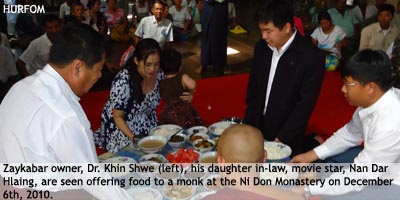 The paddy field that belongs to me is located at southwestern side of the mountain lying right at the base of the mountain. As even our village head does not stand by us, but [instead]…stands by the Zaykabar Company and threatened us to register [to accept the compensation], I finally have to register. As the people who stood by us when [we] needed [support] are in the minority, we cannot defeat them [Zaykaba Company]. Now it seems like we registered to get compensation for the exchange of our paddy field [even though it does not mean to be like that in reality]. On their project map, my paddy field is marked inside the cycle of the cement factory. Although they [Zaykabar Company] affectionately said that it is good I devoted my paddy field for the country, I am very put off and upset with those people who take over my paddy field and our village headman. Now, there is nothing left for us to work on for our living. In total my paddy field is valued at 200 million kyat, but now I only get 350,000 kyat per one acre. In fact, even if I were asked to sell them my paddy field for the price of 200 million kyat, I am unlikely to sell. However, as those people, village head, VPDC, and the Zay Ka-Bar Company, threatened and pressured me, I had to sell my paddy field to them. Personally, I still remember when the chairman Nai Kyaw Htun threatened me on December 6, and I am not going to forget what he said. What Chairman Nai Kyaw Htun said is that if you want to continue living in this village, you have to agree with them and register for the compensation in exchange for your paddy field. That means that if we the owners of paddy fields do not register, we will be compelled to leave the village. He chairman Nai Kyaw Htun said this to every paddy field owner… [it] is saying we have to register and give our land to a businessmen who has just come to do business in our home place, and if we do not want to register, we have to leave this village, our home place. That is really upsetting.
The paddy field that belongs to me is located at southwestern side of the mountain lying right at the base of the mountain. As even our village head does not stand by us, but [instead]…stands by the Zaykabar Company and threatened us to register [to accept the compensation], I finally have to register. As the people who stood by us when [we] needed [support] are in the minority, we cannot defeat them [Zaykaba Company]. Now it seems like we registered to get compensation for the exchange of our paddy field [even though it does not mean to be like that in reality]. On their project map, my paddy field is marked inside the cycle of the cement factory. Although they [Zaykabar Company] affectionately said that it is good I devoted my paddy field for the country, I am very put off and upset with those people who take over my paddy field and our village headman. Now, there is nothing left for us to work on for our living. In total my paddy field is valued at 200 million kyat, but now I only get 350,000 kyat per one acre. In fact, even if I were asked to sell them my paddy field for the price of 200 million kyat, I am unlikely to sell. However, as those people, village head, VPDC, and the Zay Ka-Bar Company, threatened and pressured me, I had to sell my paddy field to them. Personally, I still remember when the chairman Nai Kyaw Htun threatened me on December 6, and I am not going to forget what he said. What Chairman Nai Kyaw Htun said is that if you want to continue living in this village, you have to agree with them and register for the compensation in exchange for your paddy field. That means that if we the owners of paddy fields do not register, we will be compelled to leave the village. He chairman Nai Kyaw Htun said this to every paddy field owner… [it] is saying we have to register and give our land to a businessmen who has just come to do business in our home place, and if we do not want to register, we have to leave this village, our home place. That is really upsetting.
December 7th
A university graduate, 27, and Ni Do resident, explained how the campaign by Zaykabar was intended to divide local opinion on how to respond to the set compensation price of 350,000 kyat:
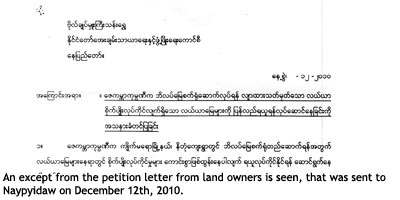 [The village headman and staff] said, ‘Don’t make yourself loose both the mongoose and your child. Give up after receiving a proper [amount of] compensation. [You] can’t oppose the project that is planned by the State. Later, you will have to lose your land without gaining any money. We won’t help you at that time. Even though you didn’t accept [the compensation offered], Zaykabar will confiscate the land that was surveyed for the State project. Machines for the [cement] plant will arrive soon’.(They) spoke to the land owners like that. After the talk, the 39 persons accepted with fear and signed the agreement at the old monastery during the visit of U Khin Shwe, his daughter-in-law, actress Nan Dar Hlaing and the Kyeikmayaw TPDC on December 6. They gave up their land. Nothing can be done. Being a business man, U Khin Shwe is very clever. Showing off his daughter-in-law who is an actress, he came to this region. He ordered [her] to convince the landowners. Since the actress arrived, as is the nature of rural [people], the villages became interested and paid attention. However, all individuals have their own worries, so I didn’t see any strong interest. And then, U Khin Shwe and his group persuade the old and religious villagers that they will arrange [for the villagers] to visit [important] pagodas all over Burma. They said that they will make excellent roads to Kyeikmayaw which [will be] available every season. The honest villagers became confused in that moment because of their talk. Zaykabar General Manager U Hein Aung Kyaw told the landowners who refused to sign, that they will come back after a week. He coerced and intimidated these residents [again] on the morning of December 7 that at that time, [saying] if [the land owners] still refuse to sign this issue will be assigned to the appropriate township authorities.
[The village headman and staff] said, ‘Don’t make yourself loose both the mongoose and your child. Give up after receiving a proper [amount of] compensation. [You] can’t oppose the project that is planned by the State. Later, you will have to lose your land without gaining any money. We won’t help you at that time. Even though you didn’t accept [the compensation offered], Zaykabar will confiscate the land that was surveyed for the State project. Machines for the [cement] plant will arrive soon’.(They) spoke to the land owners like that. After the talk, the 39 persons accepted with fear and signed the agreement at the old monastery during the visit of U Khin Shwe, his daughter-in-law, actress Nan Dar Hlaing and the Kyeikmayaw TPDC on December 6. They gave up their land. Nothing can be done. Being a business man, U Khin Shwe is very clever. Showing off his daughter-in-law who is an actress, he came to this region. He ordered [her] to convince the landowners. Since the actress arrived, as is the nature of rural [people], the villages became interested and paid attention. However, all individuals have their own worries, so I didn’t see any strong interest. And then, U Khin Shwe and his group persuade the old and religious villagers that they will arrange [for the villagers] to visit [important] pagodas all over Burma. They said that they will make excellent roads to Kyeikmayaw which [will be] available every season. The honest villagers became confused in that moment because of their talk. Zaykabar General Manager U Hein Aung Kyaw told the landowners who refused to sign, that they will come back after a week. He coerced and intimidated these residents [again] on the morning of December 7 that at that time, [saying] if [the land owners] still refuse to sign this issue will be assigned to the appropriate township authorities.
December 8th
Nai Kadut (false name), 67, a Mae Garow resident whose 7 acre parcel of land was measured inside the Zaykabar cement plant project has been 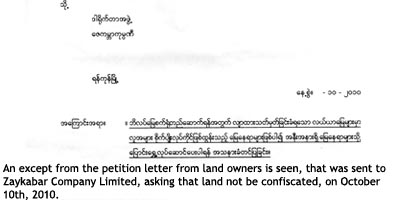 confiscated, said that all of his land was confiscated on December 8th:
confiscated, said that all of his land was confiscated on December 8th:
Everything is gone. I have been coerced into giving my signature. I was pressured two times. Even the village authorities harassed me. They said ‘with which sort of courage, do you oppose the power of the King?[5]’. And then, they asked if we want to lose both money and land, so after discussing it with my children, I signed [the agreement]. We signed at the old Ni Don monastery during the rich man, U Khin Shwe’s, visit on December 6. My land is still in the process of growing ground nut. I have no power to continue my work. My daughters said that they will go to Thailand to struggle for work again. I have suffered a lot because of this land-confiscation. Like me, in Mae Garow village, 24 landowners have already signed the agreement. Only a few are left. In Ni Don, I think the most [land owners] have already finished their signing. However, there are people who didn’t give their signatures yet [and] their land will [likely] be confiscated. My land is situated behind the west side of this [Ni Don] mountain and not far way from Sabae Guu pagoda. We have not complained about that the King [the State] helped confiscate [our land]. We can do nothing during their reign. I have to face the hardship when I am getting old.
Nai Aung Hlaing, 55, a Ni Don resident, Kyeikmayaw Township, describes to HURFOM how he gave into pressure to sell his land, but has not received compensation despite signing. He highlighted the significant impact the loss of this land will have on his family’s survival:
My paddy field has already been taken over. That was on December 8 when I had to register [to sell my paddy field to the Zaykabar company for the cement factory]. As I was told by the village head, secretary, and Zaykabar company representatives, that if I did not register I would not get compensation no second chance; Finally I had to register. After registering, as I realized that our own paddy field did not belong to us anymore but to Zaykabar Company, my wife and children started to cry. I can do nothing as they [the Zaykabar company] have to take my paddy field. But I have not been compensated yet. They said they would pay Kyat 300,000 for one acre [of paddy field] as compensation. In total, my paddy field is 6 and half acres in size, and there are still 4 acres growing groundnuts which have not been harvested yet. I do not want to keep working on the field anymore. In fact, I have not even wanted to go to the field since last November [since this pressure began]. My paddy field which I have owned almost my whole life, I do not want to see or work there anymore. We were raised on the field and we have worked as famers on this field almost our whole lives. In addition to growing rice paddy, we grow groundnuts. We depend on our farm for our livelihood, and the farm enables us to live happily. However, now our farm has been taken over, and they [the Zaykabar Company] said they would build houses for their service personals. I know they would build houses for their staffers as I was shown the map of their project by a Zaykabar Company’s staff member. There is [now] only one thing that we can [do] for work for our living, that is, fishing along the Ahdaran river. We have no other chances to work for our living but fishing. So, now apparently, our lives [go] from farmers working our own farms, to becoming fishermen fishing along the river to survive. To seek work in Thailand as migrant workers like others, we have no abilities to work like them.
December 9th
On December 9th, four Zaykabar representatives who based themselves in Ni Don village and the village headman, Nai Kyaw Tun, continued to pressure farmers to finish the signings of the compensation offer. Nai Karen (not real name), owner of 5 acres of land, spoke with HURFOM about how he and two friends, Nai Nyan (not real name) who owns 3 acres of land and Mi Tutt (not real name) who owns 5.5 acres, faced direct threats of expulsion from Ni Don by the village headmen Nai Kyaw Tun:
How they pressured us was by warning us that if we had plans to continue our lives in Ni Don village, we needed to do join this contract. They – the people from Zaykabar, Ni Don VPDC headman, Nai Kyaw Tun, his younger brother, Nai Ahwin, and VPDC members, all threatened us. I am surprised that they dare said they would expel us from the village. The guy – the headman Nai Kyaw Tun – and I grew up in the same village. I don’t know how much he got from Zaykabar to say these sorts of things. We know all about this guy. He is in huge debt [from gambling] It seems that he got a load of money from U Khin Shwe because of this situation [to pressure residents to sign over their land]. Anyhow, three of us didn’t sign and if they came to confiscate the land, we will offer the land to whom came to confiscate the land. If we were expelled from the village because of we do not give up our land, it will make a new history [for our village]. A history of being expelled from the village because of land robbery will be left in Ni Don.
December 22nd
A Mae Garow villager, 45, whose farm is 3.5 acres and located at the northern end of Ni Done Mountain. He told a HURFOM field reporter when he met.
Personally, the day when I registered to get compensation is the day when I become desperate [and] my life became hopeless. We, the whole family, depended on these 7 acres of paddy…for living. Getting benefits from it, we could build a house and give donations [at the monastery], and we could live like other people do. Also, because of this reliable paddy field, we did not have to go aboard to seek the jobs and we could also support our children going to school. However, now, our reliable farm has been taken over by other people due to living under a dictator. Even though it is said that we have to lose our farm because of bad luck, for me, I do not believe that and I have no tolerance for [talk] like that. I do not think, anyone can easily forget the sentimental feeling of how they depend on their farm, which is received from their parents, for their lives. Now, as we have no power, we have to hand our farm over to those people threatening us with power. But I do hope that one day if our people, Mon people, get sovereignty, I will get my farm back. Now, I can do nothing but tolerate [this life].
Near the end of December, HURFOM has been able to confirm that out of 213 land owners asked to accept compensation in exchange for their land by Zaykabar Company, 60 signed agreements in Late November and an additional 39 land owners agreed from December 6th to December 22nd. As a result approximately half of the landowners remain opposed to selling their land to Zakabar at the extremely discounted price. For farmers that have signed with Zaykabar, many are refusing to cultivate or even harvest their crops. All the targeted land, sold and unsold, has been measured and marked out with red flags, and some families who opted to sign their land to Zaykabar have abandoned their farms to seek shelter in Ni Don village.
Opportunity for change
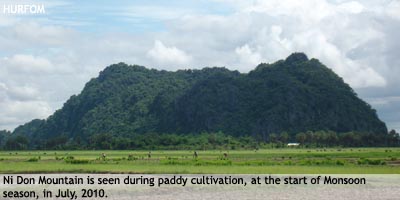 While there is no concrete evidence that the initial petition letter sent by the Ni Don community to Than Shwe has had an impact on local politics at the national level, one leading senior figure in he community commented on the perceived positive impact the letter. Bulleted concerns listed in the letter have been at least nominally addressed by Zaykabar Company during the 2nd meetings with the Ni Don Community. The unnamed source said:
While there is no concrete evidence that the initial petition letter sent by the Ni Don community to Than Shwe has had an impact on local politics at the national level, one leading senior figure in he community commented on the perceived positive impact the letter. Bulleted concerns listed in the letter have been at least nominally addressed by Zaykabar Company during the 2nd meetings with the Ni Don Community. The unnamed source said:
I don’t believe U Khin Shwe’s talk and his promises. He came with Kyeikmayaw [with the] authorities to make people afraid. He intimidated [the land owners] with the help of the [Kyeikmayaw] authorities. And then, he convinced the village headman by giving him money. Through the village headman, the villagers were coerced and intimidated to give up their land. Through these actions, nothing was honest. If you look at it from the land owners’ perspectives, most of them couldn’t [sell] their land even if they got the compensation equal with the current value. This land has been inherited from generation to generation and they depend on this traditional cultivation for their lives. We, the monk [community], want the rest of the land owners [who have not signed yet] to send an [appeal] letter to the Naypyidaw government officially. We want [them] to solve this issue directly with the government, after asking an attorneys’ advice on the laws. In the early part of the previous November, we collected nearly 100 land owners [signatures] and sent an official appeal letter to Naypyidaw. Due to that letter, I think the compensation issue has emerged now. In the appeal letter we also requested [they] not to construct the main road of the plant to Ni Don village. Now, Zaykabar said that they won’t construct the road to the village. In these cases [of confiscation], if they intend to confiscate the land, (we) must ask for a land price which equals its real value. If not, the rest of the land owners have to give up their land for nearly free at the price of three hundred and fifty thousand [kyat] per acre.
After December 8th remaining land owners and U Nyan Win began drafting a second petition to Than Shwae asking for three conditions, in which, one the government intercede to stop this development project, two, if that is not possible, guarantee the fair market price of 3 million kyat per acre, and three, do not allow the destruction of the limestone cave housing pagodas and relics as well as the local culture. The letter will be sent during the second week of January, but already the deadline issued by Zaykabar Company of the end of December, for the agreement for sales of the land in Ni Don, has passed and resistant land owners still face regular pressure to accept Zaykabars offer.
Conclusion
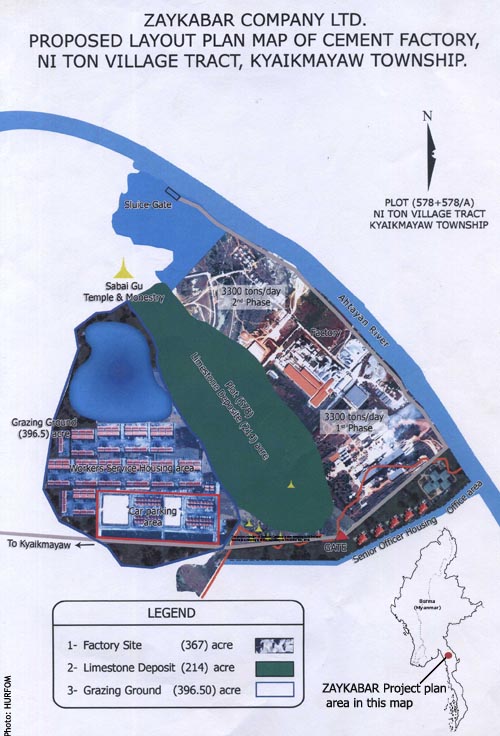 The continuation of efforts to undercut landowners in Ni Don for the price of their land raises significant concerns both locally for communities, and about the role of government at the national level. All independent sources confirm the price of land in Ni Don well above 350,000 kyat per acre. Communities that have met with Zaykabar company officials as well as village and township government leadership, have faced significant pressures to give into this price. However residents in the area are wholly dependent on their land for their livelihoods and survival, and have almost no option as an alternative way of survival if land is taken with out sufficient money to start new sustainable livelihoods.
The continuation of efforts to undercut landowners in Ni Don for the price of their land raises significant concerns both locally for communities, and about the role of government at the national level. All independent sources confirm the price of land in Ni Don well above 350,000 kyat per acre. Communities that have met with Zaykabar company officials as well as village and township government leadership, have faced significant pressures to give into this price. However residents in the area are wholly dependent on their land for their livelihoods and survival, and have almost no option as an alternative way of survival if land is taken with out sufficient money to start new sustainable livelihoods.
The role of elected officials and government connected businesses in the potential destruction of this community in such a short time after the November 7th election is a serious danger to the attempted legitimacy of the new government. U Khin Shwe, who will by the end of this month, be actively involved in the formation of the new government, has a clear and deliberate role in undermining the financial stability of this local community that is dependent on its land for survival. Though financial development has recently been lauded as an important step in the democratisation in Burma, significant concern should be given to the role of private businesses in developing projects that retain strong links to the military regimes members.
The abuses around the development of this project in Ni Don are not one of a kind. Other accounts have come in of a similar situation being carried out in Rangoon in which local residents are pressured to surrender land to private companies. With new land ownership provisions of the 2008 constitution coming into effect after the recent election, individual citizen land owners are guaranteed, in so far as they do not conflict with the interest of the state, as the state still retains the right to that land as well as all resources above and below ground[6]. HURFOM hopes that with the opening of this new government the issues regarding the rights of landowners in relation to private business as well as the state will be considered, and that efforts will be made to protect the rights of communities such as Ni Don Mae Garow villages.
[1] HURFOM’s October 2010 report details the plans for the Ni Don cement plant construction and the expected impacts the larger project would have on the local community, culture, and environment. For details please see the report at, http://rehmonnya.org/archives/1702#more-1702
[2] The official Zaykabar website can be found here at http://www.nationaldevelop.com/zaykabar.htm.
[3] For a more detailed reaction by Washington University, St. Louis, please see the full article here at http://www.burmalibrary.org/reg.burma/archives/199803/msg00060.html.
[4] The unofficial exchange rate of the kyat was being used here in discussions of payment for land, a practice that is wide spread throughout the country due to the financial weakness of the kyat. In this case 1,000 kyat is equal to approximately $1. In this case, Zaykabar Company would be offering $350 per acre of land.
[5] In this case the village official used a common local reference to state authorities of ‘Min’ which in Burmese, translates as King.
[6] Displacement Solutions & the HLP Institute, Housing Land and Property Rights in Burma: The Current Legal Framework. Thailand by Thai Graphic and Print, November 2009.
[SURVEYS 2]
Comments
Got something to say?
You must be logged in to post a comment.



















































